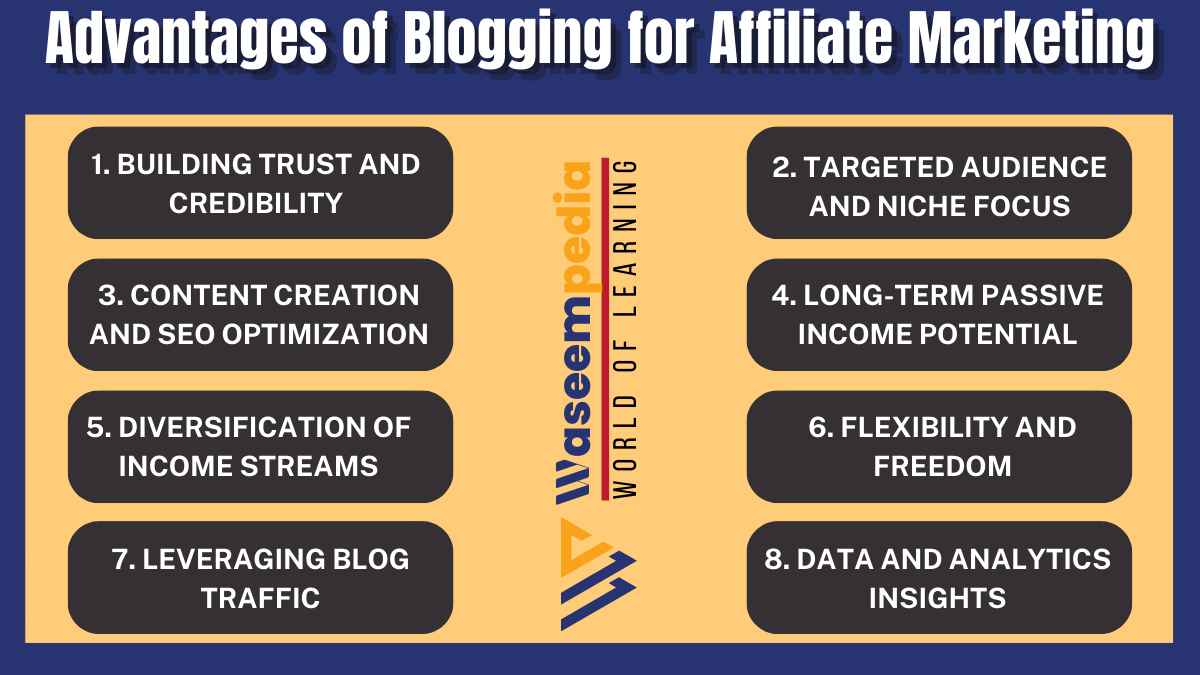Blogging for affiliate marketing having many advantages, such as building trust and credibility, targeting a specific audience and niche, creating valuable content, optimizing for SEO, long-term passive income potential, diversification of income streams, flexibility and freedom, leveraging blog traffic, gathering data and analytics insights, and collaboration opportunities. By combining valuable content with strategic affiliate promotions, bloggers can create a sustainable and profitable affiliate marketing business.

Blogging has become a powerful tool for affiliate marketers to promote products and earn commissions. By combining valuable content with strategic affiliate links, bloggers can leverage their platforms to drive traffic, generate sales, and earn passive income. In this article, we will explore the advantages of blogging for affiliate marketing and why it has become a popular and effective strategy for monetizing blogs.
The Power of Affiliate Marketing
Affiliate marketing involves promoting products or services and earning a commission for each successful referral or sale. By incorporating affiliate links into their blog content, bloggers can monetize their platforms and earn passive income. Let’s delve into the advantages of blogging for affiliate marketing in more detail.
9 Advantages of Blogging for Affiliate Marketing
There are many advantages of blogging but 9 Advantages of Blogging for Affiliate Marketing are as following.
1. Building Trust and Credibility
One of the key advantages of blogging for affiliate marketing is the ability to build trust and credibility with your audience. By consistently providing valuable content and recommending products that align with your audience’s needs and interests, you establish yourself as a trusted authority in your niche. This trust and credibility lead to higher conversion rates and increased affiliate sales.
2. Targeted Audience and Niche Focus
Blogging allows affiliate marketers to target a specific audience and focus on a niche. By selecting a niche that aligns with the products or services you promote, you attract a highly targeted audience who are more likely to be interested in your recommendations. This targeted approach increases the relevance of your content and improves the chances of converting your audience into customers.
3. Content Creation and SEO Optimization
Blogging provides a platform for affiliate marketers to create valuable content that educates, informs, and engages their audience. By producing high-quality blog posts, tutorials, reviews, and comparisons, you not only provide value to your readers but also optimize your content for search engines. This SEO optimization helps drive organic traffic to your blog and increases the visibility of your affiliate links.
4. Long-Term Passive Income Potential
One of the most attractive advantages of blogging for affiliate marketing is the long-term passive income potential. Once you have created and optimized your blog content, it continues to attract visitors and generate affiliate sales even when you’re not actively promoting it. With strategic affiliate partnerships and evergreen content, you can earn passive income while focusing on other aspects of your business or enjoying personal time.
5. Diversification of Income Streams
One of the primary advantages of Blogging is Diversification of Income Streams. Blogging for affiliate marketing allows you to diversify your income streams. Instead of relying solely on ad revenue or sponsored content, affiliate marketing provides an additional source of income. By promoting a variety of products or services within your niche, you can diversify your affiliate partnerships and maximize your earning potential.
6. Flexibility and Freedom
Blogging for affiliate marketing offers flexibility and freedom in terms of content creation and monetization. As a blogger, you have the freedom to choose the products or services you want to promote, the content formats you want to create, and the timing and frequency of your promotions. This flexibility allows you to align your affiliate marketing strategy with your audience’s needs and preferences while maintaining control over your blog’s direction.
7. Leveraging Blog Traffic
Blogging provides a platform to leverage your blog’s traffic for affiliate marketing purposes. As your blog attracts a steady stream of visitors, you can strategically place affiliate links within your content, sidebar, or call-to-action buttons. By seamlessly integrating affiliate links into your blog, you increase the visibility of your recommendations and enhance the chances of earning commissions.
8. Data and Analytics Insights
Blogging for affiliate marketing allows you to gather valuable data and analytics insights. Through affiliate marketing platforms and tracking tools, you can monitor the performance of your affiliate links, track conversions, and analyze the effectiveness of your promotional efforts. These insights help you optimize your strategies, identify high-performing products, and make data-driven decisions to maximize your affiliate earnings.
9. Collaboration and Partnerships
As a blogger in the affiliate marketing space, you have opportunities for collaboration and partnerships. You can establish relationships with affiliate networks, brands, and other bloggers to expand your reach, access exclusive offers, and negotiate higher commission rates. Collaborating with like-minded individuals and industry experts can amplify your affiliate marketing efforts and open doors to new opportunities.
Related FAQ’s
Is blogging good for affiliate marketing?
Yes, blogging can be beneficial for affiliate marketing as it provides a platform to create relevant content, build an audience, and promote affiliate products.
What are the advantages of blogging in marketing?
Blogging in marketing offers advantages such as building brand authority, increasing website traffic, improving SEO, and fostering customer engagement.
What are the three purposes of blogging?
The three purposes of blogging are:
Informative: Sharing valuable information, insights, and updates.
Engagement: Connecting with and engaging the audience.
Promotion: Promoting products, services, or ideas.
Which 3 are types of blog?
The three types of blogs are:
Personal Blogs: Reflect personal experiences, thoughts, and interests.
Business Blogs: Focus on industry updates, company news, and expertise.
Niche Blogs: Concentrate on a specific topic, catering to a targeted audience.
What are the challenges of blogging?
The challenges of blogging include:
Consistency: Maintaining a regular posting schedule.
Quality: Producing high-quality, engaging content.
Visibility: Gaining traction and attracting readers.
Competition: Standing out in a crowded blogosphere.
Monetization: Generating revenue from the blog.
SEO: Ensuring good search engine visibility.
Time Management: Balancing blogging with other tasks.

